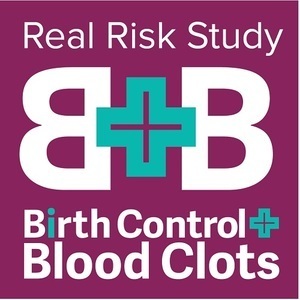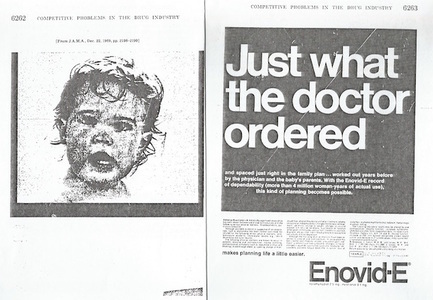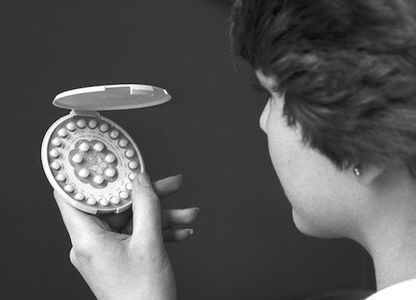Dr. Ernst Rietzschel described his findings as ‘startling.’ His fellow cardiologists buzzed in agreement after he presented the findings at the American Heart Association 2007 annual meeting. His Ghent University lab in Belgium had discovered that women taking hormonal birth control and those who ever took them for more than a year have an increased risk of atherosclerosis, plaque build-up in their arteries. And, the risk goes up with the duration of use – up to a 42% increased risk with each decade.
This was different from the clotting issues most doctors associated with The Pill. They viewed clotting as a short-term side effect that receded after a woman stopped taking synthetic hormones. However, plaque build-up continues long after a woman stops taking birth control and could ultimately lead to deadly consequences like a stroke or heart attack.
Building Blocks
Ideally, medical research is like a set of building blocks. Each new study builds on the foundation of past experiments. While taking us to a new level of understanding, the new study also provides the foundation for the next layer of discovery that lies ahead.
Dr. Rietzschel’s study contained its own internal set of building blocks. The team initially discovered that women taking hormonal contraceptives had a threefold increase in C-Reactive Protein (CRP) levels. The liver typically increases CRP production in correlation to inflammation levels in the body. Consequently, high CRP levels can act as a marker to indicate the presence of other diseases or conditions.
Dr. Rietzschel explained how this dramatic rise in CRP levels led to discovering the increased risk of atherosclerosis.
“This is the first time that this has been documented. It was an accidental finding. We were stunned by the large elevations in CRP that you see in women taking the pill, so we then performed a safety analysis to see whether there was a link between past pill use and atherosclerosis measured by echo in both the carotid and femoral arteries.”
Single Layer Research
Rietzchel’s results were groundbreaking, but in many ways, his study exemplifies everything that is wrong in medical research related to hormonal birth control. The ideal building-block metaphor has never really materialized. Rather than resembling a pyramid, the blocks making up birth control research look more like someone let their rambunctious four-year old brother into the room. These blocks, scattered in disarray, rarely stack to even a second level.
The investigator accurately described his findings as startling, but even more disturbing is that they were discovered entirely by accident. If CRP levels in the subjects hadn’t been so ridiculously elevated, the researchers might never have considered the link between The Pill and atherosclerosis – despite the fact that the foundation had been laid decades earlier.
With any half-hearted Google search, you can discover that some of the leading factors contributing to atherosclerosis include: high blood pressure, high blood sugar levels, diabetes, and high cholesterol levels. The birth control pill’s contribution to each of these conditions was discussed in depth at the Nelson Pill Hearings in 1970.
Birth Control and High Blood Pressure
Dr. Laragh testified at the hearing that his discovery of the relationship between oral contraceptives and high blood pressure came by chance.
“We observed a woman who we knew had normal blood pressure develop rather severe and impressive hypertension several months after starting an oral contraceptive medication.”
He confirmed this behavior in several other patients and found that, in most cases, the blood pressure returned to normal after stopping The Pill. After they normalized, two patients who had no previous history of high blood pressure requested to continue with birth control pills. In both cases, their hypertension reappeared, and then disappeared upon terminating the medication.
Dr. Laragh stressed that his trial size was too small to have statistical significance, but this ‘rechallenge experiment’ convinced him of a cause and effect relationship. Having also observed that some women ‘swell up and accumulate salt and water,’ he deduced a probable mechanism that could be triggering high blood pressure in birth control patients.
To test his theory, he began measuring certain components of the kidney hormonal system and found that women on birth control experienced enormous increases in renin substrate levels. Renin substrate circulates through the blood and has the capacity to release angiotensin. Dr. Laragh described angiotensin as ‘the hormone which is the most powerful of all hormones in its capacity to raise the blood pressure.’
His suspicions seemed to be confirmed by a 2011 study (40 years later), which found that birth control so significantly elevated angiotensin levels that it could cause false-positive results for aldosteronism.
Another block on the floor…
While addressing the big picture, Dr. Laragh offered a couple of important caveats for the medical industry. First, he strongly recommended that any patient on birth control be seen by the doctor every 2 to 3 months to monitor her blood pressure.
When questioned about such frequent follow-ups, he warned, “We have a responsibility when we have powerful drugs like this; our responsibility is to learn about them, and the second responsibility is to apply the information. Otherwise, we do not have any right to have them on the market.”
Blood Sugar Levels and Diabetes
Further evidence of oral contraceptives’ causal relationship with high blood pressure came in Dr. Philip Corfman’s testimony, when he matter-of-factly stated, “It is known that steroids alter the diameter of veins and other blood vessels. These effects are also related to the changes in blood pressure observed in some users of oral contraceptives. Several reports of hypertension have appeared and there is an increasing body of evidence that there may be a positive relationship.”
Dr. Corfman had previously headed a task for at the National Institutes of Health. His team combed through nearly 4,000 journal articles and sorted the concerns into more than 20 categories that they felt needed further attention. Much of his testimony focused on birth control’s metabolic effects on the body, particularly how the synthetic hormones modified carbohydrate metabolism.
“Recent investigations show that a significant proportion of normal women on these agents appear to handle sugar in an abnormal way.” He continued, “Another biologic change of increasing concern is the effect on the way the body handles fat. This effect is closely related to changes in sugar metabolism since fat synthesis is related to insulin levels. The changes which have been observed in fat metabolism simulate levels seen in older individuals and raise concern over the possibility that these alterations may be related to heart disease.”
And this was no rare event, Dr. Victor Wynn testified that nearly 1-in-5 young women taking The Pill developed an abnormal glucose tolerance that he named “chemical diabetes.”
The Pill and High Cholesterol
Recognizing that there were also abnormalities in the fats circulating in the blood of birth control patients, Dr. Wynn decided to measure triglycerides against a control group. He discovered that “at least one-third of the users had triglyceride values higher than the highest value we found in our control subjects.” Let that sink in – the woman with the very highest triglyceride values from the control group had numbers lower than one-third of the women on The Pill.
In his beautiful British accent, Dr. Wynn slyly added, “I am sure that there is no need for me to tell an American audience the significance of having your cholesterol levels elevated, since there is so much propaganda in the press, medical, and lay, indicating the importance of having your cholesterol lower, if you can possibly achieve it.”
In order to demonstrate the domino effect of these complications, Dr. Wynn submitted a summary of over 70 references taken from medical literature over the previous 3 years.
“It is by no means exhaustive. But the references are to the association between abnormal glucose metabolism, abnormal insulin levels, and abnormal blood lipid or blood fat levels, and the accelerated development of atherosclerosis.”
More blocks on the floor…
Don’t Discount Clotting
World-renowned neurosurgeon, Dr. David Clark testified that the strokes young women on birth control encountered were different than those seen in older patients. The Pill seemed to trigger a different mechanism, as ‘alterations in the normal clotting behavior are certainly present.’
“There is some reason also to believe that there may be changes in the vascular wall itself. It is known that estrogens have an effect on the caliber of veins. In some of the stroke victims who have been studied, there is a peculiar beaded appearance to the walls of the arteries -– not occlusion, but irregularity of outline that suggests there may be edema or other changes in the outer wall of the artery.”
Dr. Wynn added, “When you see the abnormalities, these are associated in some curious way with increased incidence of clotting, so that putting the two together, I think it is a reasonable case, but it cannot be proved, and this underlines the great difficulty we have with the contraceptives, that what harm they may do may never in fact be proved.”
At the rate we’re going, it will certainly never be proved.
Second Level Stuff
However, there is a seed of hope on at least one front.
After his study that uncovered the startling link to atherosclerosis, Dr. Rietzschel told Medscape:
“I’m certainly not advocating stopping use of the pill,” he noted. First, the findings need to be replicated, “that’s really important,” he said, “and then we need more research. It’s staggering that for a drug that is being used by 80% of women, there is so little information about the long-term safety. That’s really incredible.”
It is very common for the lead investigator of a negative study to make statements like “This doesn’t mean women should stop taking The Pill” and “Certainly more research needs to be done,” I suppose in an attempt to appease pharmaceutical companies. But Dr. Rietzchel’s statements were different. You could sense his genuine dismay that so little has been done to understand the safety of hormonal contraceptives.
This prompted me to contact Dr. Rietzschel to see if he was aware of any subsequent studies building on his atherosclerosis findings (10 years have lapsed since its publication). It turns out, his team is in the final stages of a longitudinal study, and he expects the analysis to be published within the next year.
This is a promising development. Let’s just hope no one let’s their four-year old brother into the room.

The FDA approved The Pill despite it not being proven safe. Today, it has been linked to everything from blood clots and cancer to lupus and Crohn’s disease — and still has not been proven safe.
This book explores the medical and historical disconnects that brought us to this point.
Last updated on October 21, 2023 at 9:38 pm – Image source: Amazon Affiliate Program. All statements without guarantee.
We Need Your Help
More people than ever are reading Hormones Matter, a testament to the need for independent voices in health and medicine. We are not funded and accept limited advertising. Unlike many health sites, we don’t force you to purchase a subscription. We believe health information should be open to all. If you read Hormones Matter, like it, please help support it. Contribute now.
Yes, I would like to support Hormones Matter.






























